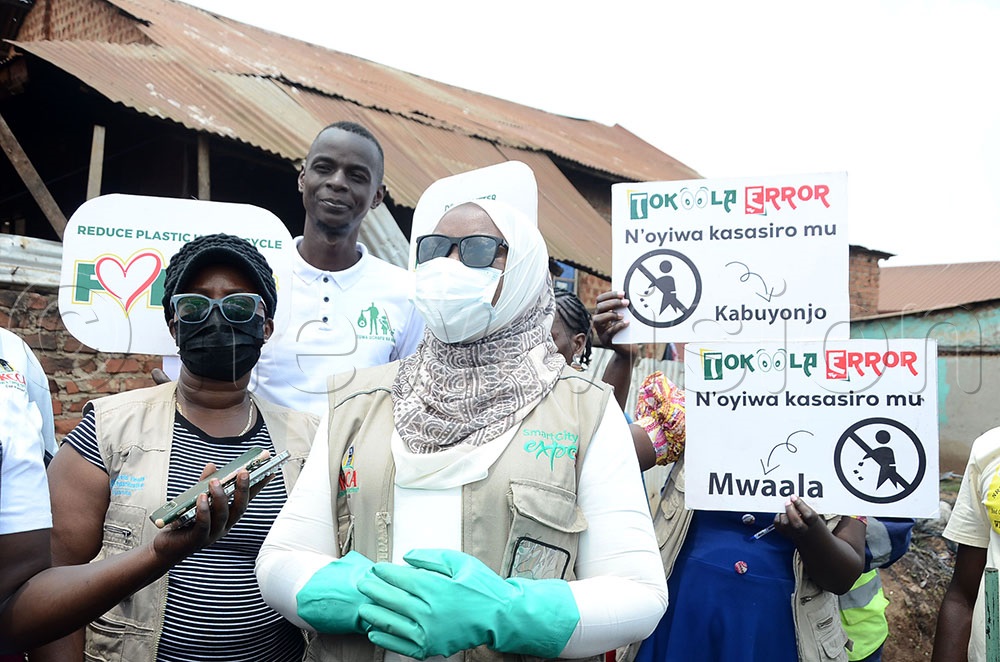KCCA intensifies Weyonje campaign with Ndeeba clean-up
“This city can only remain clean if communities take ownership,” Buzeki told residents. “We all must adopt safe toilet practices, dispose of waste properly, and participate in regular neighbourhood clean-ups.”
Kampala Capital City Authority (KCCA) workers cleaning up a water channel during a Weyonje campaign clean up exercise in Ndeeba parish, Rubaga division, on September 6, 2025. (Credit: Lawrence Mulondo)
KAMPALA - Kampala’s leaders rolled up their sleeves, joining residents in a spirited clean-up exercise as the city authority intensified its Weyonje campaign, a sanitation drive aimed at tackling poor waste disposal, unsafe toilet practices, and conditions that continue to threaten public health.
On Saturday, September 6, Kampala Capital City Authority (KCCA) executive director Sharifah Buzeki, her deputy Benon Kigenyi, and director for public health Dr Sarah Zalwango led a major clean-up in Ndeeba parish, Rubaga division.
Together with residents, they collected heaps of rubbish, unclogged drainage channels, and spoke passionately about the need for collective responsibility in keeping Kampala clean.
“This city can only remain clean if communities take ownership,” Buzeki told residents. “We all must adopt safe toilet practices, dispose of waste properly, and participate in regular neighbourhood clean-ups.”
The leaders emphasised clearing water channels, many of which feed into the historic Kabaka’s Lake, warning that blocked drains increase the risk of flooding and disease outbreaks.
Community sensitisation at heart of the campaign
Beyond sweeping and digging, the leaders used the event to sensitise locals about waste management.
Buzeki reminded residents that under the Weyonje campaign, KCCA has consistently urged them not to dump rubbish or human waste into trenches.
“Whenever someone does this, they block the channel and put the whole community at risk,” she said.
She added that a recent survey in the area revealed many channels were being misused as dumping grounds and even latrines.
“Now that they are clean, we implore locals to keep them that way,” she said, noting that sorting waste and keeping bins ready for collection were mandatory responsibilities for all households.
Residents also raised concerns about delayed waste collection by contracted companies. Buzeki admitted to receiving similar complaints and said KCCA had cautioned these companies to designate clear collection days.
Kampala Capital City Authority (KCCA) Executive Director Sharifah Buzeki addressing residents, as Director for Public Health Dr. Sarah Zalwango looks on. This was during a Weyonje campaign clean up exercise in Ndeeba parish Rubaga division, on September 6, 2025. (Credit: Lawrence Mulondo)
Tackling infrastructure gaps
The clean-up also highlighted gaps in sanitation infrastructure. Market vendors in Ndeeba pleaded for access to public latrines, and Buzeki promised that KCCA would work with the Rubaga division town clerk to secure land and construct the much-needed facilities.
Deputy executive director Kigenyi, meanwhile, addressed the issue of poorly constructed small trenches around homes that pour water into neighbouring compounds.
He urged local council leaders to enforce proper construction and pledged that division engineers would help link small trenches to main channels to reduce flooding.
Dr Zalwango reminded residents that the Weyonje campaign is not about one-off clean-ups.
“These exercises give us an opportunity to work side by side with communities, but sanitation must be a daily commitment,” she said.
She encouraged households to sort waste at the source, pointing out that while unsorted waste is rubbish, sorted waste can generate income through recycling.
She noted that door-to-door sensitisation efforts have already begun paying off, with the tonnage of sorted waste steadily increasing across Kampala.
What the community says
Local leaders and residents welcomed KCCA’s presence in their neighbourhood. George William Sambwa, chairperson of Kironde zone, admitted that lack of resources such as trucks, hampers monthly clean-ups.
He appealed for more support, particularly for waste collection and public latrine construction.
For ordinary residents, the message was simple but urgent. “We ought to take responsibility,” said Annet Nantege, a resident of the area. “If we don’t keep our homes clean, it is us who suffer the consequences.”
Market vendor Umar Musoke called for tougher laws against irresponsible disposal, especially in slum areas where rubbish carried by stormwater often accumulates.
“During the rainy season, the situation gets worse, with waste flowing from as far as Makindye and Katwe,” he lamented.
Another resident, Farooq Abed, stressed the need for frequent trench maintenance. “When the rains come, the floods put lives at risk. Regular cleaning is the only way to stay safe,” he said.